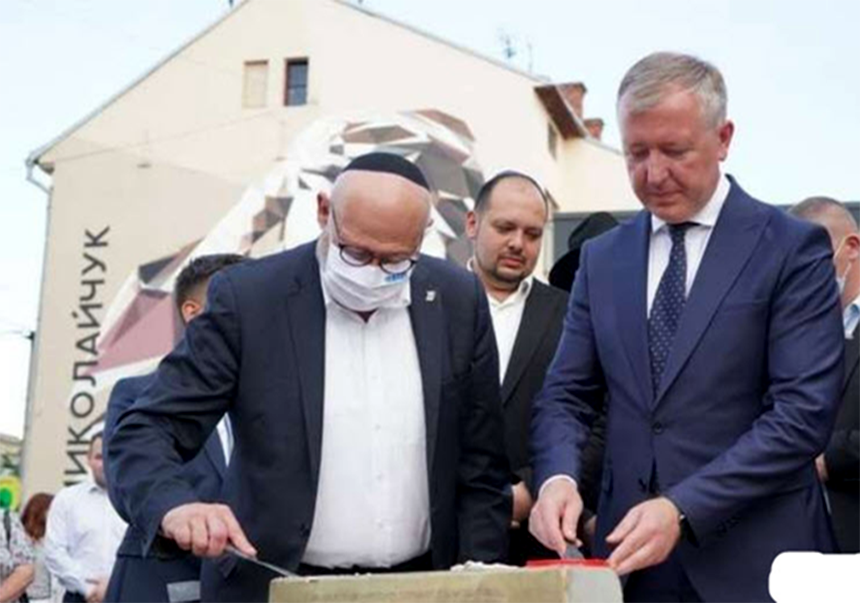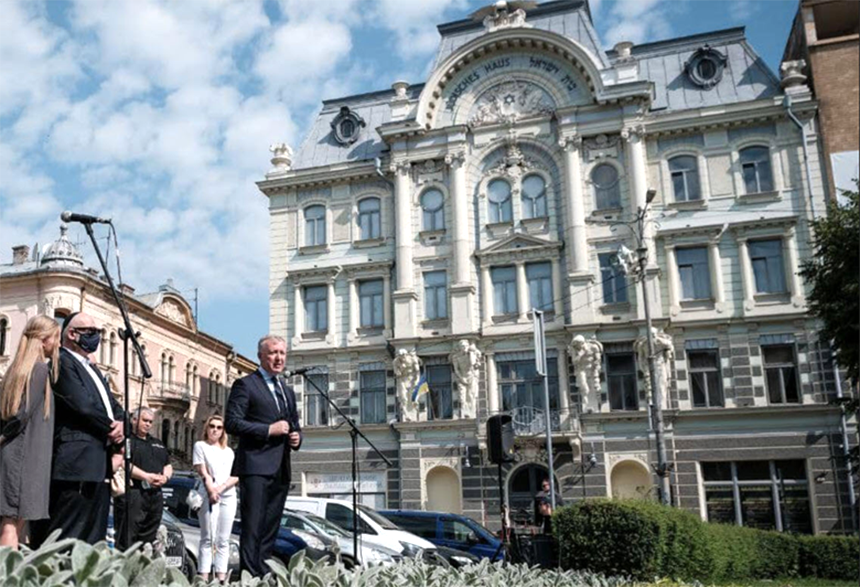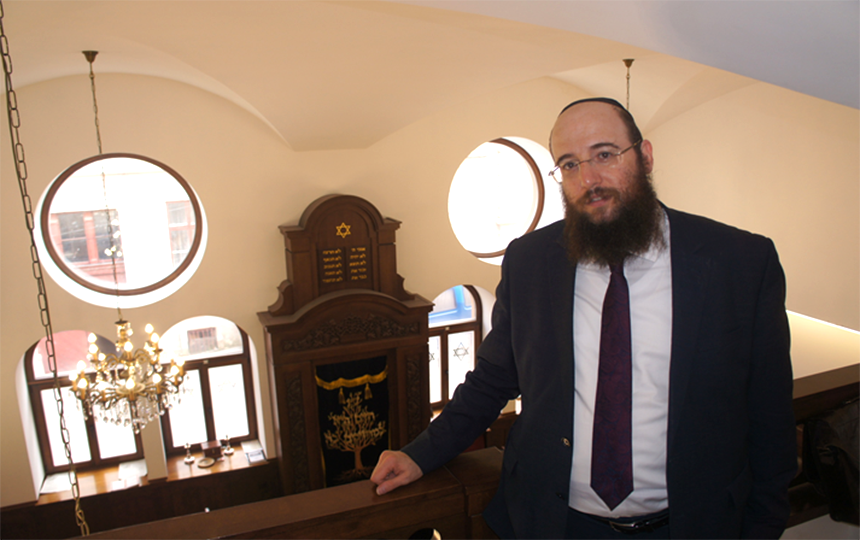Fragments of glass in a pocket: Bukovyna remembers the past for the sake of the future
On 6–9 July 2021, Chernivtsi was the site of events dedicated to the eightieth anniversary of the beginning of the Holocaust in Bukovyna. Joel Lion, Ambassador Extraordinary and Plenipotentiary of the State of Israel to Ukraine, participated in a commemoration that took place on 7 July on Theater Square, as well as a liturgy for those who perished in the village of Bila.
“Eighty years ago, people like us lived in this city, with their everyday problems, desires, and dreams. However, they were suddenly removed from their homes by soldiers in black uniforms. They had come to Chernivtsi in order to kill those who were building this city with their wisdom, strength, and labor. Such crimes should never happen again,” said Serhiy Osachuk, head of the State Administration of Chernivtsi Oblast.
The crimes against the Jews of Chernivtsi were set in motion in July 1941. The first step taken by the Romanian government, which had been restored in Northern Bukovyna [after a previous Soviet occupation that started in June 1940 — Ed.], was to outlaw the Jewish population. Between 5 and 9 July 1941, over 2,300 Jews were killed and tortured in Chernivtsi and its vicinities. And on 7–8 July, Sonderkommando 10-b herded nearly four hundred Chernivtsi Jews into the Romanian Palace of Culture, where they were tortured mercilessly over the course of two days. They were eventually brought to a military shooting range near the village of Bila, where they were forced to dig pits and later shot.
As part of the commemoration of Holocaust victims in Chernivtsi, a themed exhibit and a forum entitled The Holocaust in Bukovyna were held. Speaking at the forum, Governor Osachuk said: “When we put our hand into the pocket of our memory, we feel fragments of glass. They cut us again and again, blood flows. But whether we want to or not, we have no right not to remember the events and victims of the Holocaust.”
A commemorative marker known as the “Threshold of Memory” has appeared at the Ivan Mykolaichuk Cultural and Arts Center in Chernivtsi, where the Maccabi Stadium once stood. “Throughout all of June 1942, thousands of Jewish residents of Chernivtsi were deported to Transnistria from this place [the stadium of the Jewish sports society known as Maccabi],” states the inscription on the commemorative marker.
Diplomats from three states — the ambassadors of Germany, Israel, and the General-Consul of Romania — took part in the unveiling ceremony.

“Eighty years ago, on a July day in 1941, began the operation to destroy those Bukovynians who with their own hands, intellect, and strength of spirit built this cradle of European tolerance — the city of Chernivtsi. Our duty is to ensure that the memory of the victims of Nazism will live on in all generations. Never again will we allow such a terrible crime to take place in our state,” said Osachuk, unveiling this marker.
During the ceremony, Anka Feldhusen, Ambassador of the Federal Republic of Germany in Ukraine, said in Ukrainian: “Please accept my apology and that of my country for what we did.”
During the installation of the commemorative marker, the head of the State Administration of Chernivtsi Oblast put forward an initiative to transfer to the city’s Jewish community the historic building of the Jewish People’s House (1908), where the municipal Palace of Culture is located today. “As a resident of Chernivtsi, I would like to propose an initiative that can become the symbol of acknowledgement of the loss and restoration of justice. The Jewish community of Chernivtsi and Bukovyna built the Jewish People’s House with its own funds. It is time for us, residents of Chernivtsi, to return it to the Jewish community,” Osachuk declared.

Yohanan Ron Singer, head of the World Organization of Bukovinian Jews, joined in the commemorative events on Zoom from Israel.
“Today, the city’s Jewish community numbers only a few thousand people. On the initiative of Rabbi Glitzenstein, we have proposed to organize events in honor of the eightieth anniversary of the beginning of the Holocaust in Bukovyna. The oblast and municipal authorities fully support us,” Leonid Milman, the head of the Jewish community of Chernivtsi, told the Ukrainian Jewish Encounter (UJE).
On the third day of the events held to honor the tragic past, a business forum focused on a future partnership between Israel and Ukraine was held in Chernivtsi. On the initiative of the Embassy of Israel in Kyiv, ten Israeli companies in the fields of dairy production, water resources, medicine, and urban management presented their technologies and proposed cooperation with a potential partner from Ukraine.
I would like to emphasize two points that highlight these July events.
First, other major cities in western Ukraine did not officially commemorate the eightieth anniversary of the beginning of the Holocaust, even though in early July 1941, a wave of pogroms and shootings of the Jewish population swept through two dozen cities and towns in this region. Regrettably, local bodies were silent and did not mention the start of the destruction of their Jewish neighbors. This silence and ignoring of the Holocaust topic, even in connection with the eightieth anniversary of the tragedy, may be connected with an unwillingness of local and oblast authorities to raise painful questions related to the past, which include the participation of some locals in pogroms that took place in the summer of 1941.
Second, the phenomenon of contemporary Bukovyna is an important factor of personal leadership. The governor of Bukovyna, Dr. Serhiy Osachuk, is a professional historian, archivist, and researcher of the history of the rescue of Jews in his city. Osachuk was the only governor in Ukraine to post words of support for Israel during the rocket attacks from Gaza in May 2021.
The chief rabbi of Chernivtsi and Bukovyna, Menachem Mendel Glitzenstein, noted during his conversation with UJE: “Before the Second World War Chernivtsi was a city with Jewish coloring. All nationalities lived with respect for one another. This spirit remains even today. On these days, the city always pays respect to those who perished and whose civilization disappeared in the flames of the Holocaust. The memory of this will help us continue to live in mutual respect, and this will change the spiritual foundation of the city.”

“Chernivtsi was always a city marked by a unique blend of cultures, and it is precisely mutual aid and the interaction of various cultures and ethnic groups which formed the city’s unique look that we know today. After holding these large-scale events, we can confirm that the Jewish community of Chernivtsi is alive and kicking and acting for the benefit of the city and its residents,” Milman told UJE.
Text: Shimon Briman (Israel).
Photos: Website of the State Administration of Chernivtsi Oblast; Facebook page of the Embassy of Israel in Ukraine.
Translated from the Ukrainian by Marta D. Olynyk.
Edited by Peter Bejger.




















